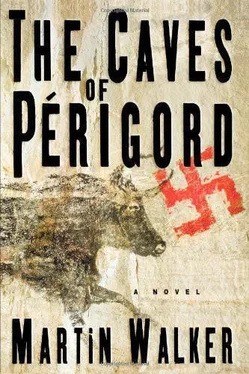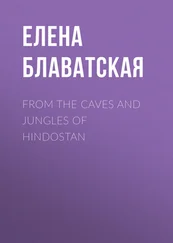Martin Walker - The Caves of Perigord
Здесь есть возможность читать онлайн «Martin Walker - The Caves of Perigord» весь текст электронной книги совершенно бесплатно (целиком полную версию без сокращений). В некоторых случаях можно слушать аудио, скачать через торрент в формате fb2 и присутствует краткое содержание. Жанр: Триллер, на английском языке. Описание произведения, (предисловие) а так же отзывы посетителей доступны на портале библиотеки ЛибКат.
- Название:The Caves of Perigord
- Автор:
- Жанр:
- Год:неизвестен
- ISBN:нет данных
- Рейтинг книги:4 / 5. Голосов: 1
-
Избранное:Добавить в избранное
- Отзывы:
-
Ваша оценка:
- 80
- 1
- 2
- 3
- 4
- 5
The Caves of Perigord: краткое содержание, описание и аннотация
Предлагаем к чтению аннотацию, описание, краткое содержание или предисловие (зависит от того, что написал сам автор книги «The Caves of Perigord»). Если вы не нашли необходимую информацию о книге — напишите в комментариях, мы постараемся отыскать её.
The Caves of Perigord — читать онлайн бесплатно полную книгу (весь текст) целиком
Ниже представлен текст книги, разбитый по страницам. Система сохранения места последней прочитанной страницы, позволяет с удобством читать онлайн бесплатно книгу «The Caves of Perigord», без необходимости каждый раз заново искать на чём Вы остановились. Поставьте закладку, и сможете в любой момент перейти на страницу, на которой закончили чтение.
Интервал:
Закладка:
“The lord of the air salutes the lord of beasts,” he chanted from beneath the great beak as he bent his knee before the bull’s skull. “The beings of water and land and air salute the lord bull.”
The silence was absolute as the bull’s skull seemed almost to tremble-in the still air. The Keeper of the Bulls, suddenly in his mask become half-bird and half-man, rose and turned toward them, his arms outstretched like mighty wings. He looked up, and the eyes of the crowd followed. And from the rock outcrop on the hill above came a beating of real wings and a great eagle rose into the sky, cawing as it flapped and began to spiral upward above the assembled people.
“The sacrifice is accepted,” called the birdman.
Who had devised this unprecedented ritual? The chief hunter and fisher and the Keeper of the Bulls must have arranged it, even rehearsed it, among them. The Keeper of the Horses dragged his eyes back to the rock outcrop whence the eagle had appeared and saw a flash of movement. Human, he was sure. It would be simple enough to catch an eagle by digging a man-sized hole, covering it with brushwood, and placing a lure on top. A dead rabbit or bird would do. And then as the eagle stooped, the hunter in his hole could quickly draw tight the looped thong that would imprison the eagle’s talons. He had seen it done. And it was no great trick to release the bird at a certain, well-timed moment. A trick, but a clever one, he thought.
But what was its purpose, this carefully planned ritual? It had been as dramatic as it was curious, even moving in its way, he thought. But it made him uncomfortable, as though the river of the tribe’s life in which he took such comfort had suddenly been diverted into a different path, its flow broken and disturbed by the plunging splash of a great stone. He shivered. Still, it must be over now and the hunt could begin.
All around him, the men were stamping their feet and cheering. The boys were dancing with excitement, strutting and thrusting their feeble spears forward as if facing a real enemy. He glanced again at his fellow Keepers, caught the watery old eye of the Keeper of the Bison, who shook his head slightly, leaned forward and spat. At least not everyone was caught up in the madness. He looked again at the cheering men, all their eyes aflame, and turned to the Keeper of the Bulls, who stood with his arms outstretched above the fire, his eagle’s head almost ghostly in the smoke.
“Let the great hunt commence,” he chanted.
They came upon the herd while the sun was still climbing in the sky. The band of men was stretched out now, the two best hunters scouting far off ahead and out of sight. The older men were trailing badly, the boys all clumped together at the front of the line but with sense enough to be silent. The sign the scouts had left was a forked stick, thrust into the ground, with three twigs placed in the shape of an arrow to point the way. The chief hunter picked up his pace from the steady lope he had maintained since they left the village, sprinting uphill to the next ridge, and then dropping to squirm forward and keep his body from suddenly appearing on the skyline. He came back to the main body, and in another unusual feature of this strange day, went up to the Keeper of the Bulls, as if telling him alone where the herd was placed and where the beaters should go. The Keeper of the Bulls nodded his approval.
The Keeper of the Horses knew this place. He had hunted here before as a young man. There was a river valley ahead of them, and some distance to the left a steep drop to the water. He watched the hunters take the boys off to the right to form the line of beaters. The hunters would anchor each flank of the line, and then race forward to make the line into a curve, using their bows against the reindeer on the sides of the herd, less to try for a kill than to drive the herd in the desired direction.
With the rest of the grown men, the Keeper of the Horses began loping toward the riverbank, to set the jaws of the trap that would force the game over the drop. This was the real test of the chief hunter’s skill, less to find the herd than to coordinate the movements of so many boys and men so that they would all be in the right place at the best time. Chief hunters who closed the tribe upon an empty trap did not last long. There were always keen young hunters eager to take over. The Keeper of the Horses found himself hoping that the trap might be empty this time. The tribe would miss a feast, might even go hungry awhile, but another chief hunter might not be so ready to fall in with the strange new rituals of the bull’s skull.
There was still no sign of the herd when the men reached the cliff above the drop to the river. This was a good place. On this nearer side where they approached, thick trees gave way to a jumble of rocks before the cliff edge. The herd would avoid the trees and the rocks could be held by just a handful of men. The rest of them ran swiftly along the cliff edge, looking for the place to set their fence. Every man carried three poles, each one almost as tall as a man and lashed together at one end with sinew. They spread out the other end of the poles to form a tripod, and then placed each tripod perhaps ten yards apart, from the cliff edge up toward the direction from which the herd would come. They lashed skins to each tripod, to make it look like a solid shape, a small teepee, flimsy but appearing solid enough to dupe the reindeer. Each man then sat behind his tripod, waiting for the time. Some of them tossed blades of grass into the air, testing that the breeze still came toward them. The Keeper of the Horses ambled across to the cliff edge and looked into the drop. It was the height of three or four men. It would serve.
“So we are now all worshipers of the bull,” grunted a voice behind him. He turned. It was the Keeper of the Bison, looking ancient and leathery. He had done well to keep up with the pace of the hunt.
“Worship?” he replied. “I respect all men, and pay due tribute to each man’s skill. I honor all beasts, those we hunt and eat and those we watch with caution from afar and those we no longer see in these lands. I bow to the sun for its warmth, to snow for its cold, and to the river for its water. And to the Mother for the gift of life that lies in a woman’s belly. Just as our people have always done.”
“And I fear lightning and the great sounds of battle in the skies before a storm,” said the old man. “I have lived too long to devote myself to a single beast, or to bow before a single man.”
“Our Keeper of the Bulls seems to have persuaded many of our people-otherwise. The chief hunter first among them.”
“Chief hunters don’t last long,” the old man spat. “But what does our Keeper of the Bulls want?”
The Keeper of the Horses shrugged, and looked back away from the river. The herd should be coming soon, although he could as yet hear no drumming of hooves, no high-pitched cries from the beaters.
“You must stop him,” said the old man patiently. “Already, we are changing as a people. We are becoming worshipers of the bull, led by the Keeper of the Bulls. Do you see what he is doing?”
As the Keeper of the Horses nodded, he heard the first piping cry from the far-off beaters, and then the tremor beneath his feet. The herd was coming. “We will talk of this again, old friend,” he said. “Back to our posts.”
Deer felt exultant, the thrill of the hunt upon him, until he reached the great cloud of dust that was all that he could now see. The hunters had led them at a fast run for as long as it took the sun to move a hand’s width across the sky. One of the advance scouts was waiting for them, leaning on a rock just below the skyline, and he trotted quickly to meet them. The hunters conferred and then fanned out to either flank, and begun the slow walk toward the herd. The scout led the boys, using his bow as a guide to slow them so that the hunters could move ahead and become the points of the great curve that was advancing on the herd. He led them up to just below the ridge, halted them as he looked over again, and then waved the two points of the horn forward. His arms outstretched above his head, the bow clutched between them, he held the impatient boys for as long as a man could hold his breath, and then turned with a great cry and led the rush over the ridge and down toward the startled herd.
Читать дальшеИнтервал:
Закладка:
Похожие книги на «The Caves of Perigord»
Представляем Вашему вниманию похожие книги на «The Caves of Perigord» списком для выбора. Мы отобрали схожую по названию и смыслу литературу в надежде предоставить читателям больше вариантов отыскать новые, интересные, ещё непрочитанные произведения.
Обсуждение, отзывы о книге «The Caves of Perigord» и просто собственные мнения читателей. Оставьте ваши комментарии, напишите, что Вы думаете о произведении, его смысле или главных героях. Укажите что конкретно понравилось, а что нет, и почему Вы так считаете.












